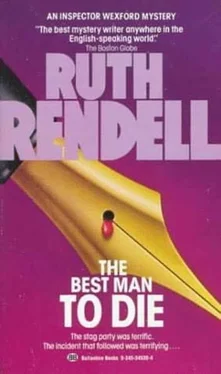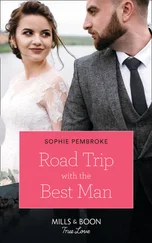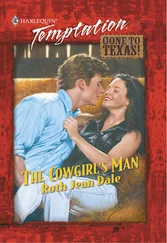Ruth Rendell - The Best Man To Die
Здесь есть возможность читать онлайн «Ruth Rendell - The Best Man To Die» весь текст электронной книги совершенно бесплатно (целиком полную версию без сокращений). В некоторых случаях можно слушать аудио, скачать через торрент в формате fb2 и присутствует краткое содержание. Жанр: Детектив, на английском языке. Описание произведения, (предисловие) а так же отзывы посетителей доступны на портале библиотеки ЛибКат.
- Название:The Best Man To Die
- Автор:
- Жанр:
- Год:неизвестен
- ISBN:нет данных
- Рейтинг книги:4 / 5. Голосов: 1
-
Избранное:Добавить в избранное
- Отзывы:
-
Ваша оценка:
- 80
- 1
- 2
- 3
- 4
- 5
The Best Man To Die: краткое содержание, описание и аннотация
Предлагаем к чтению аннотацию, описание, краткое содержание или предисловие (зависит от того, что написал сам автор книги «The Best Man To Die»). Если вы не нашли необходимую информацию о книге — напишите в комментариях, мы постараемся отыскать её.
The Best Man To Die — читать онлайн бесплатно полную книгу (весь текст) целиком
Ниже представлен текст книги, разбитый по страницам. Система сохранения места последней прочитанной страницы, позволяет с удобством читать онлайн бесплатно книгу «The Best Man To Die», без необходимости каждый раз заново искать на чём Вы остановились. Поставьте закладку, и сможете в любой момент перейти на страницу, на которой закончили чтение.
Интервал:
Закладка:
‘Nothing fresh come back to her?’
‘If you mean about the girl in the car, she says there was no girl. I know when she’s telling the truth.’
‘People never remember what happened immediately before they got hit on the head,’ Wexford said cheerfully, ‘especially when their skulls are fractured. It’s a medical fact.’
‘Is that so? I mustn’t keep you, Chief Inspector. Did you know your dog’s out in the road?’
Wexford retrieved Clytemnestra from the path of a solitary oncoming car. The driver wound down his window and cursed him, adding that for two pins he’d tell the police.
‘Blooming thorn in my flesh, you are,’ Wexford said to the dog as he clipped the lead on. ‘A source of humiliation.’ He watched the girl retreat into the Olive and Dove, the moonlight casting her shadow black, straight and attenuated.
Chapter 13
Detective Constable Loring was delighted at the prospect of a day in London. He was mortally afraid of Wexford who, he felt, treated him with a just but unremitting harshness. Someone had told Loring of the chief inspector’s almost paternal fondness for his predecessor, Mark Drayton, and of his disillusionment when Drayton had come to grief. It had been over some mess with a girl and a bribe. Drayton, they told him, had worn his hair long, had been surly and sarcastic and clever and a devil with the women. Loring, therefore had his own hair cropped eccentrically close and was as eager, as bright and cheerful as he could be. Cleverness, he felt, must come hereafter. At present he couldn’t compete with Wexford and Burden who were constantly being clever all over the place. As for the women… Loring was healthily keen. It afforded him considerable pleasure to be going to London on a quest for three missing girls. Wistfully he thought how very gratifying it would be to find the right one and perhaps hear an appreciative Wexford call him Peter. Drayton had frequently been favoured by the use of his Christian name.
For all his dreams and his naiveté, Loring was a perfectly competent officer. He made his mistakes and he was frank about them. At twenty-one he was six feet tall, as thin as he had been at fourteen, and desperately anxious for the day to come when he had finally grown out of his acne. For all that – the spots were far less noticeable than he believed – the girls he asked out usually accepted his invitations and the older women he interviewed patted their hair and smiled when he began his questions. With luck, he sometimes thought, when he put on a bit of weight and got rid of those damned spots, he might one day look rather like John Neville. He was surprised and somewhat chagrined by his reception at the Eastcheap hairdresser’s.
Carol Pearson was the girl whose disappearance he was investigating and he had already called on her mother in Muswell Hill. A skittish lady of forty with the mental age and taste in dress of eighteen, she had simpered over him and offered him gin. God knew, you were only young once – Mrs Pearson looked as if she intended to be young several times over – and if Carol chose to pop off with her boy friend for a couple of months, she wasn’t one to stand in her way. The boy friend was married, so what else could poor Carol do? The fact was she was sick to death of that job of hers, threatening to leave any time. Did Loring know the miserable wages they paid, the fact that the girls practically had to live on their tips! The boy friend had money. He was a travelling salesman, Mrs Pearson said vaguely. But she couldn’t recall his name, hadn’t been able to tell the police when they asked before. Jack, Carol had called him. She never wrote letters. Easy come, easy go like her mother she was, and Mrs Pearson gave him an ingratiating smile. She’d turn up one of these fine days.
So Loring had taken the tube to Tower Hill, getting lost a couple of times on the way. He walked up Eastcheap and picked out the office of the late Jerome Fanshawe by the brass plate on its marble doorway. Roma, the hairdresser’s where Carol Pearson had worked, was diagonally opposite. Loring went in.
Never in his life had he seen anything like that receptionist. She wasn’t the sort of girl you would dare to kiss, supposing you wanted to. Her hair was an artfully and deliberately tangled mass of red curls, the face beneath a miracle of paintwork, an artist’s achievement of cream and amber light and shade with sooty eyes and blanked-out mouth. She wore a near-ankle-length black skirt, backless red boots and a short red caftan embroidered in gold.
Both her white telephones rang simultaneously as Loring entered. She lifted the receivers one after the other, said into each, ‘Good morning. Roma. Will you hold the line one moment?’ before resting them side by side on her enormous appointments book: ‘Can I help you?’
Loring said he was a police officer and produced his card. She betrayed no surprise. ‘One moment, please.’ The telephone conversations were consecutively resumed, appointments made in the book. Loring glanced down the salon. Nothing like it had ever been seen in Kingsmarkham where clients still sat isolated in separate cells. Here the walls were lined in what looked like huge slices of pumpernickel. The chandeliers were black and silver mobiles and the floor a seemingly frozen lake of scarlet. Most of the assistants were men, tired worn-looking young men in light-weight suits drifted all over with many-coloured hair.
‘If you’ve come about Carol Pearson,’ the receptionist said contemptuously, ‘you’ll want Mr Ponti. One moment, please.’ The left-hand phone had rung again. ‘Good morning. Roma. Will you hold the line a moment, please? He’s in the gentleman’s salon and he’s styling so you can’t… Just one moment.’ She lifted the second phone. ‘Good morning. Roma. Just one…’
‘Thank you for all your help,’ Loring said. He retreated into the street and entered the door to what he would have called the barber’s. It was not very different from its Kingsmarkham equivalent. Things in the world of fashion evolve more slowly for men than for women.
Mr Ponti looked more like a master at a public school than a hairdresser. He was tall and thin and he wore a perfectly plain, almost ascetic dark Suit. The only indication that he had in fact been ‘styling’ was the handle of a pair of scissors protruding from his breast pocket and which Loring, so overpowering was the pedagogic impression, had at first taken for the rims of spectacles.
The other stylists leapt aside deferentially as he wove his way along the aisle between the chairs. The daylight from the door showed suntan powder on his cheekbones and now that he was close to, Loring saw him as an actor made up to play some academic part. The stoop was there, the vague though sharp expression, the myopic eyes.
A very faint trace of an Italian accent came through as he spoke. ‘Carol?’ he said. ‘We have had the police here before and I told them, we cannot help.’ He took the black leather handbag from Loring and fingered it appreciatively. ‘This is very nice quality, very good.’ With a shrug, he swept shut a concertina-style folding door that partly closed off the shop. ‘Listen, she would not have this. I don’t like to be cruel, but she was a cheap little girl. No style, no elegance. Ha!’ From the interior of the bag he took out the Woolworth compact and the lipstick in its grazed metal case. ‘These she might have, this cheap rubbish.’ His long thin nose quivered disdainfully.
Loring thought him an odious man. ‘Have you ever had a Mr Jerome Fanshawe among your clients?’
The name was evidently familiar. ‘The stockbroker from across the street? I am told he is dead in a car accident.’ Loring nodded. ‘He has never been here.’
Читать дальшеИнтервал:
Закладка:
Похожие книги на «The Best Man To Die»
Представляем Вашему вниманию похожие книги на «The Best Man To Die» списком для выбора. Мы отобрали схожую по названию и смыслу литературу в надежде предоставить читателям больше вариантов отыскать новые, интересные, ещё непрочитанные произведения.
Обсуждение, отзывы о книге «The Best Man To Die» и просто собственные мнения читателей. Оставьте ваши комментарии, напишите, что Вы думаете о произведении, его смысле или главных героях. Укажите что конкретно понравилось, а что нет, и почему Вы так считаете.












